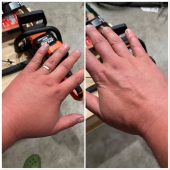posted 7 months ago
A fellow gardener, was saying how terrible the squash bugs were this year. She wanted to know what I do to protect my squash? Like an idiot I said I don't do anything, with the exception of a little aphids on my beans in August I don't really have bug problems. I know better than to challenge mother nature like that. ( Advice was to keep picking them off, and if that isn't enough to check the Internet for organic solutions. Next year don't plant all her squash together) I don't have squash bugs, but I do have stink bugs, and maybe cucumber beetle, I'm not sure, I don't really know bugs. I was watering late the other night and it was dark so I had a flashlight. I start to see stink bugs. I had flower scissors so I cut them, and squished them.
I have been on the lookout ever since. I have only seen a few. Tonight I removed all the leaves below the zucchini, and removed the borage I had down as mulch (put it in a bag and put it in the garage.) In my main garden I found a couple bugs and no eggs. By the time I made it to my outer garden I was totally dark. I was finding eggs, I was removing them. I started to get bombarded by what I thought were wasps. I didn't think wasps flew at night, plus I was in this part of the garden earlier and didn't see one wasp. What ever they were there was a lot, and they were coming at me and my light. Several landed on me, but I didn't get stung. When I was young I got stung by a bee. I had a nasty reaction, not life threatening, but a lot worse than a normal reaction. The doctor said I should be very careful because the reaction can get a lot worse, or I could grow out of it. I have never been stung since, so I'm careful. I called it a night.
My husband said wasps don't fly at night, so I wonder what they were? They were coming from the squash that has the most damage, and the only one (so far) that I have found eggs on. What ever they are I hope they are some kind of predator bug, and help keep the stink bugs in check.
Everyone thinks I'm a nut because I don't do a lot to control these things. I don't like using even organic bug Killers. I strongly believe nature will balance itself. If we interfere it messes up the balance. I'm not saying I won't spray off aphids with water, or remove squash bugs, and eggs, if it gets super bad, I may try something else, but I really hope it doesn't come to that. I wouldn't be surprised if I had stink bugs, or the like last year. I've seen the damaged leaves before. I just didn't know what it was. I didn't do anything last year, and still managed to get lots of squash, and pumpkin.
My plan is to go back in the daylight and try to remove as many eggs and bugs I can find. Hopefully the predator bugs and I can keep it under control.
I'm wondering if you have stink bug, squash bug, cucumber beetle, or other, what you do to keep them in check? Also if anyone has an idea of what night time flying wasp like creature could be, I would like to hear. Thanks
“We can complain because rose bushes have thorns, or rejoice because thorn bushes have roses.” — Abraham Lincoln

 6
6





 4
4




 5
5




 7
7




 2
2




 1
1




 3
3









